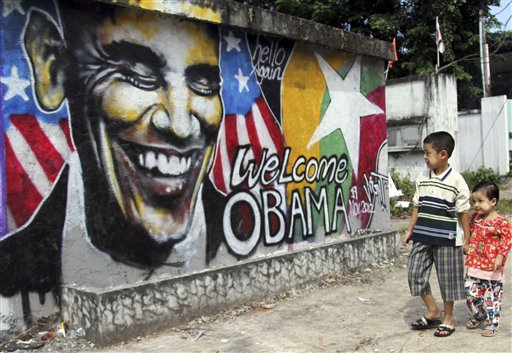By JIM KUHNHENN
Associated Press
WASHINGTON
In his first trip abroad since the summer heat of the re-election campaign, President Barack Obama will seek to reinforce American influence in Southeast Asia in spite of the large shadow cast by China. He will become the first U.S. president to visit Myanmar, an appreciation for its steps toward democratization, as well as Cambodia.
The four-day trip beginning Saturday will be the president’s fourth to Asia. It comes amid unusual challenges at home, including opening discussions with lawmakers about dealing with the nation’s fiscal health and a sex scandal that’s roiling his national security team.
Still, Obama is eager to return to foreign policy matters that were put on the back burner by the campaign. The unprecedented visit to Myanmar, also known as Burma, gives the trip a historic edge while shoring up a strategic regional goal sought with stops in Thailand and in Cambodia, where he will attend the East Asia Summit in Phnom Penh.
The Asia trip underscores Obama’s efforts to establish the United States as an Asia-Pacific power, a worldview defined by 21st century geopolitics but also by Obama’s personal identity as America’s first Pacific president. Obama was born in Hawaii.
In choosing this time to travel _ the East Asia Summit was scheduled some time ago _ Obama is taking advantage of his electoral success, and his international counterparts are bound to be in a congratulatory mood.
But Obama also heads out at a sensitive time for the U.S. economy. Only six weeks remain before automatic tax increases and deep spending cuts kick in _ they create the so-called fiscal cliff _ that could set back the economy if Obama and congressional Republicans don’t find agreement on a deficit-reduction plan.
Stephen Hadley, national security adviser to President George W. Bush, cautioned that failure by Washington to resolve the fiscal cliff could signal to emerging economies that the democratic system is flawed.
But China also has problems with corruption and a sluggish economy.
The precarious nature of the budget negotiations is not lost on Asian countries, and Obama will likely find himself on the sidelines offering reassurances to other leaders that the U.S. will not plunge over a fiscal cliff.
Telegraphing Obama’s response to that concern, White House national security adviser Tom Donilon conceded that “after a decade of war … there will be reductions in the U.S. defense budget.”
He added: “Guided by our new defense strategy, our defense spending program will continue to support our key priorities, including our presence and missions in Asia.”
During the brief stop Monday in Myanmar, Obama will meet with opposition leader Aung San Suu Kyi and President Thein Sein and deliver an address in which he will call for continued political reforms in a country that had been internationally shunned for decades.
The East Asia Summit includes the 10-member Association of Southeast Asian Nations and eight other nations: the United States, China, Japan, South Korea, India, Russia, Australia and New Zealand.

COMMENTS
Please let us know if you're having issues with commenting.